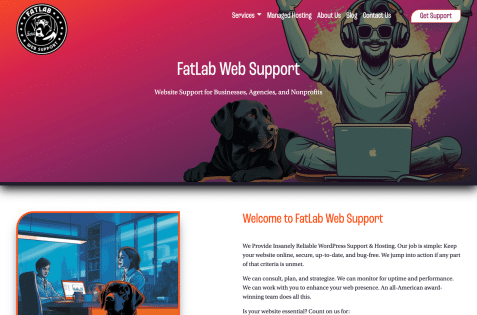A Website Maintenance Company
We believe every organization deserves a strong and secure online presence to reach its customers and members, share its mission, and grow its business.
FatLab Web Support is an award-winning website development and support firm established in 2010.
Our unique value proposition is that we are dedicated solely to supporting your current website while providing managed web hosting with the highest levels of security and performance.
Our mission is to provide reliable web support services so our clients can expand their online presence without worrying about devoting resources to monitoring or maintaining it themselves.
With this philosophy in mind, our vision at FatLab Web Support is for all businesses and nonprofit organizations to have access to easily accessible web support solutions allowing them freedom from hours spent managing a website on their own.
WordPress maintenance services:
- Regular WordPress updates.
- Daily file and database backups
- Daily malware scanning.
- Virtual vulnerability patching.
- Monthly activity and health reports.
Website support services include:
- On-Call tech support.
- Unlimited support for current features.
- Free consulting and planning.
- 24/7 Uptime and performance monitoring.
- 24/7 support access.

A Website Maintenance Service Company
FatLab Web Support provides comprehensive WordPress maintenance services to help businesses and nonprofits reach their online goals.
As a dedicated WordPress maintenance services company, we specialize in providing outstanding customer service and technical support, from bug fixes and security patches to content updates and site enhancements.
Our web ticket system allows clients to create and manage requests around the clock for a reliable experience, while a dedicated account manager is available for all client inquiries.
Unlike many other web design companies, our primary focus is website support services rather than one-off projects – because we know that keeping your business up and running isn’t something you can afford to take lightly.
At FatLab, it’s our mission to ensure the success of your website; forward-thinking solutions meet robust technology so you can achieve stability, scalability, and growth!
By harnessing this combination, we offer an exceptional user experience that will set your business apart from the competition with every mouse click!
A proactive approach to website maintenance services
For more than ten years, FatLab has been offering website maintenance services. Our website maintenance services include a comprehensive suite that updates your website with the latest features and security patches.
Our proactive maintenance approach and commitment to continuously monitoring website health set us apart. We are about so much more than just website updates.
We don’t just react when issues occur but work tirelessly to prevent them from happening in the first place. In particular, our WordPress website maintenance service keeps your site from degrading over time or becoming vulnerable to security threats.
With FatLab, your website stays online, safe, and secure and performs well in search engines.
The FatLab Management Team

Shane Larrabee
Shane Larrabee is an innovative and highly experienced web developer and founding member of FatLab, LLC
With over two decades of knowledge from working with various marketing and public relations communications agencies, web design agencies, studios, and other businesses, Shane specializes in back-end development (PHP) within content management systems such as WordPress.
His expertise within the WordPress sphere has developed over 12 years and is primarily focused on custom theme and plugin development.
Shane has served clients worldwide – from Fortune 500 companies to small startups, national PACs, to grassroots movements – by offering custom solutions for their unique needs.
His support-focused business model and his eye for problem-solving make him a trusted go-to for many high-profile organizations.

Ritz Penaranda
Meet our Managing Director, Ritz! With over 16 years of experience in website project management, Ritz is an expert in delivering results.
Her “let’s get it done” attitude ensures that every project is delivered on time, within budget, and to the highest quality.
Ritz takes great pride in solving client problems and finding intelligent solutions that exceed expectations. What sets her apart is her ability to look at projects through the eyes of the client.
Her exceptional customer service skills and ability to build long-lasting relationships have made her a highly sought-after project manager.
Having worked in the association and nonprofit world, Ritz understands organizations’ unique challenges. She is passionate about creating value for her clients and helping them achieve their goals.
More than just tech support
At FatLab, we pride ourselves not only on our tech support services but also on the diverse expertise of our management team.
Our leaders hail from various backgrounds, including agency, studio, and nonprofit management, bringing a wealth of strategic knowledge. While we excel at website and WordPress maintenance services, we are also here to address larger business needs.
Our team is equipped to consult on custom development projects and help devise a long-term strategy for your online presence. Trust us to squash any bugs and keep your site running smoothly while providing invaluable insights and solutions for your business.
Technical tasks are the basis of strategy
We are web developers and project managers at our core, but our senior team brings something extra. With a background in strategy, we’re uniquely positioned to take care of your website and help you improve your online presence over time.
That’s why we offer website maintenance services beyond basic maintenance tasks. From monitoring website performance to updating software and plugins, we’ll make sure your site is always running smoothly and efficiently.
With our expertise in WordPress maintenance services, we can provide you with everything you need to enhance your online presence and make a lasting impact on your customers. Trust us to take your website to the next level and help you achieve long-term success online.

Our Origin Story
In 2010, Shane Larrabee embarked on a journey to revolutionize the web development and design industry. Having experienced firsthand the prevalent focus on building new websites rather than supporting current ones, Shane identified a stark gap in the market. And FatLab was born!
We pledged to put our clients first, focusing on their needs and delivering quick fixes and support that aligns with their long-term strategies.
With a team of seasoned developers and project managers, we have transformed web support and maintenance into an integral component of your business success.
We pride ourselves on the quality of our customer service and the high-performance secure infrastructure that guarantees the best performance and user experience. Join us and experience the difference at FatLab!

Our unique management team
Shane Larrabee and Ritz Penaranda’s success story spans over two decades and starts with their serendipitous meeting in Washington, DC.
Ritz managed several websites for a prominent trade association and entrusted Shane’s company with website design, building, and maintenance, setting in motion a longstanding partnership that has flourished today.
Though Ritz has since departed the trade association to join FatLab, the association remains a loyal client.
Over the years, Shane and Ritz have tackled and overcome numerous challenges in their mission to deliver impactful digital solutions to clients, from patching bugs in early web browsers such as Netscape to creating mobile-responsive websites as flip phones gave way to smartphones.
With an enviable track record of delivering exceptional customer service and building countless award-winning websites for various businesses, including numerous nonprofits, Shane and Ritz have cemented themselves as industry experts and continue their mission to bring every client’s digital vision to life.
The "FatLab" Name
FatLab is a unique and innovative company named after a beloved and unforgettable furry friend.
Guinness, Shane’s loyal and chubby black Labrador, inspired the company’s branding and symbolizes the unfailing devotion and companionship that FatLab dedicates to every customer.
At FatLab, we believe that our name embodies our boundless potential and limitless abilities. With the same creativity we used to name ourselves, we tackle every task with unwavering excellence.


A U.S. Based WordPress Support Company
FatLab, an esteemed Virginia-based Limited Liability Company (LLC), was founded in Washington, DC’s bustling hub.
With an extensive client base across the USA and Canada, many of whom hail from the major East Coast business centers, including New York, Baltimore, DC, Atlanta, and Miami, FatLab is dedicated to offering quality work and seamless customer experiences.
At FatLab, we tailor our services to suit your needs. Whether discussing your business objectives in the boardrooms of K Street or collaborating over beverages in charming coffee shops across Seattle, we’re flexible enough to adapt to your preferences. And with the power of technology, we can also connect with our clients online, making work a breeze wherever you are. Join hands with FatLab and experience innovation at its finest.
A small company with BIG infrastructure

FatLab, proud to be a Gold Cloudways Agency Partner, is a leading provider of managed infrastructure services.
Our partnership with Cloudways provides our clients with dedicated and unparalleled web infrastructure services.
We ensure that our clients receive access to superior and secure hosting solutions at competitive rates.
Our unique partnership with Cloudways enables us to offer our clients priority support, 24×7 server monitoring, and access to dedicated servers and network engineers.
We guarantee to offer reliable support and swift deployment, scaling, and reaction to any situation at a moment’s notice.
We take pride in delivering no-cost WordPress site migrations, free SSL certificates across all our website maintenance packages, and additional protection through our state-of-the-art firewall, 30-day (minimum) backups, and continuous monitoring.
Unlike many other development companies, we don’t rely on cheap shared plans to run our clients’ sites. Instead, we have invested significantly in secure hosting solutions to ensure our clients receive the best value for their money. Trust FatLab for secure and intuitive managed infrastructure services that satisfy all your business needs.
We have worked with some great clients over the years.















A Modern Company
Discover FatLab, a website support agency decades ahead of the curve. From utilizing a unique approach to team building and work environments, we dared to venture and promise to take you along.
Our Alexandria, VA office has no borders. Staffed with agile professionals worldwide, we work around the clock to ensure your business thrives.
We are experienced in maximizing productivity with tools like centralized code repositories, ticket systems, video chats, and VOIP phone systems.
Streamlined systems
At FatLab, we pride ourselves on providing efficient, organized, and transparent services to our clients through our seamlessly integrated CRM, support ticket, and billing systems. We don’t just cater to our client’s needs; we go beyond them.
Our billing systems are designed to ensure there are no surprise charges — every task has a corresponding ticket number reflected on your invoice, keeping your finances transparent and in your control.
With our VOIP phone system, we’re always reachable no matter where we are. Our ticket support system ensures that as soon as you reach out to us, we’re immediately notified of your request or any related updates.
At the heart of our business is our monitoring system that keeps us alert 24/7 to every issue that needs our attention. Our proactive approach lets us catch issues early, saving you time and hassle.
Moreover, we have multiple dedicated teams to handle your every need, whether you need web developers or server engineers.
Our management system also ensures that our teams are in constant communication, so you can be sure that your issues will always be resolved promptly.
Our Web Support System
Welcome to FatLab Web Support, where customer satisfaction is our top priority.
We understand that, more often than, you might have faced issues with unresponsive customer service from your current provider, and that’s where we step in to make a difference.
At FatLab Web Support, we pride ourselves on providing timely and efficient web support solutions. Our dedicated support desk system is designed to cater to all your needs and ensure that your support requests are not just limited to a generic support@ email box.
Instant client support alerts
With our instant notification feature, we receive real-time alerts of your issue, and our team works round-the-clock to ensure that your requests are resolved in record time, with an average initial response time of under two hours!
We understand that communication is key, and that’s why we provide multiple channels through which you can track the progress of your tickets online, via email, or even call us.
We believe in providing our clients with unparalleled services, and with FatLab Web Support, you can be assured of a hassle-free experience. Join our family today, and never worry about reaching us again!
We are available via multiple communication channels:
- Support ticket system
- Phones
Tools and Techniques for Effective Website Maintenance
We utilize sophisticated tools and techniques to ensure your WordPress website remains functional, secure, and up-to-date. We conduct regular website health checks as part of our maintenance services and implement any updates or patches immediately to keep your site running at its best.
A core offering of our website maintenance plan is regularly scheduled backups to prevent data loss, and we perform meticulous testing after every update to ensure your website remains fully operational. We use a combination of manual testing and automated tools to check for broken links and load times and conduct regular security monitoring, including a real-time firewall, malware scanning, and guaranteed malware removal if ever needed.
In addition to uptime monitoring as part of our WordPress maintenance services, we monitor your website’s performance and traffic patterns using advanced analytics.
By understanding the behavior and preferences of your site’s visitors, we can make informed decisions about potential enhancements, services, speed optimization, and modifications, ensuring your website continues serving your business goals effectively. This comprehensive, multi-faceted approach guarantees maximum uptime and optimal performance of your WordPress website.


A Glance at Our Comprehensive Maintenance Offerings
At FatLab, LLC, our maintenance services cover an extensive range of offerings, catering to diverse website needs. We complete basic maintenance tasks such as regular WordPress updates ensuring your site’s themes, plugins, and core software are always up-to-date with the latest versions. Our maintenance tasks also involve routine website cleanup, where we clear your WordPress database of unnecessary data, optimizing your site’s speed and performance.
We delve into more complex territory with our advanced WordPress maintenance services. These include performing detailed website audits that comprehensively assess every component of your site, identifying potential issues, and recommending basic maintenance solutions and strategic actions for improvement. We also handle critical security tasks, such as regular security scans to identify vulnerabilities and immediate application of patches to ward off threats.
Further, we offer emergency support services, ensuring that our expert team is available round-the-clock to address any sudden issues that may arise. Additionally, we dedicate efforts towards performance optimization, enhancing your website’s speed, responsiveness, and overall user experience.
All our maintenance services are designed with one central aim – to ensure that your WordPress website operates seamlessly, securely, and effectively to serve your business goals.
More Than Just Maintenance Services, Support
Web maintenance is just one element of our comprehensive web support services. Our core competence lies in offering expert WordPress support, ensuring your website remains updated, secure, and optimized for performance.
Our technical web support extends beyond routine maintenance, encompassing development support to enhance your WordPress site’s functionality and user experience. This may be with custom development services, premium plugins, or enterprise-grade web hosting. With our team on hand, you can expect professional, confident assistance tailored to your specific needs.


Our Mission is Transparent and Regular Communication
Our mission as a web support company is to provide you with full transparency and complete peace of mind. Our dedication to keeping you informed and updated on all aspects of your web support requests sets us apart from the rest.
With our streamlined communication system, you will receive regular updates via email, and all communications will be securely archived for easy reference. This level of transparency ensures you have a complete history of each issue, allowing for accurate reviews should any questions arise.
In addition, we keep billing transparent and honest. Every task is broken down with granular billing, so you know exactly what you’re paying for and can review the time applied to your account at any time.
We believe that complete transparency is the key to a successful partnership. Let us show you the difference it can make.
Pricing
At our consultancy, we believe that every client’s needs require unique solutions, so we don’t publish our project or hourly rate online.
We know that a one-size-fits-all approach doesn’t work.
As a part of our tailored service, we take the time to get to know each and every client to identify their needs and create unique solutions to their challenges.
Contact us today to start the journey toward an effective and personalized solution for your needs.
Accessible Budget Services Include:
- A competitive hourly rate.
- Free guaranteed not to exceed estimates.
- Unlimited reviews and revisions for every task we take on.
- A flat-rate comprehensive maintenance plan that includes hosting, maintenance, and unlimited (unbilled) support for current features and functions.
- Free project consulting and planning.
Related News & Blog Posts
Discover why we at Fatlab made the confident decision to switch from Zendesk to Hubspot as our web support ticket system. Find out all the advantages and features this change has meant for us and our clients.
Explore the realm of High Availability WordPress Hosting with our in-depth guide. Learn how to boost your site’s uptime and performance, ensuring a reliable and seamless user experience for your high traffic WordPress website.
Our process of transitioning web servers from PHP 7 to the more robust PHP 8. PHP 8 brings substantial benefits, including improved performance and security.
Learn how Fatlab leveraged Artificial Intelligence and creative design concepts to create an entirely new user experience.
FatLab elevates hosting services by integrating Cloudflare Enterprise, providing clients with advanced security and optimized performance as standard. Enjoy the peace of mind that comes with industry-leading protection and speed, without any additional fees.
Transform your website’s security with FatLab’s innovative solutions to WordPress contact form spam. Our clients enjoy a spam-free experience, ensuring their sites are secure, user-friendly, and impeccably maintained, thanks to our proactive approach.





